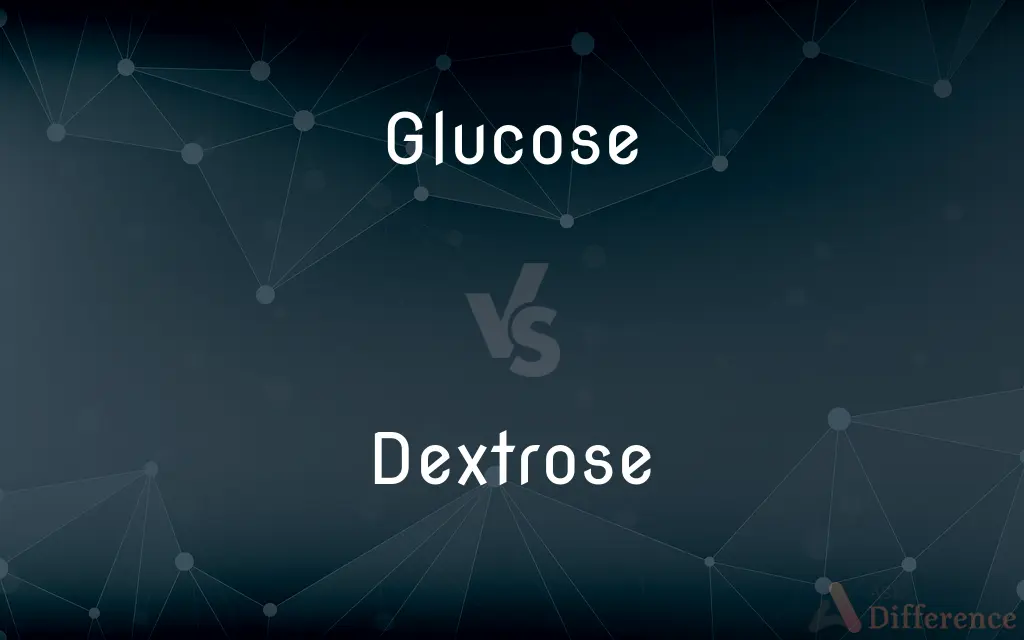Glucose vs. Dextrose — What's the Difference?
Edited by Tayyaba Rehman — By Fiza Rafique — Updated on September 24, 2023
Glucose is a simple sugar, a monosaccharide, vital for energy in living organisms. Dextrose is the commercial name for glucose used in food and medical industries. Both terms often interchange in certain contexts.

Difference Between Glucose and Dextrose
Table of Contents
ADVERTISEMENT
Key Differences
Glucose is a naturally occurring monosaccharide, which is a building block for many carbohydrates. Dextrose, on the other hand, is the commercial name for the glucose produced from corn and used widely in foods and medicinal products.
Glucose plays an essential role in cellular respiration, providing energy for cellular functions. Dextrose is essentially the same compound, and when consumed, offers the same energetic benefits as glucose.
In medical settings, glucose tests are commonly prescribed to check for conditions like diabetes. Dextrose is frequently found in IV solutions, providing a quick energy source for patients who cannot consume food.
In the food industry, glucose is sometimes found as a sweetener or in baking. Dextrose, being the commercial term for glucose, is also commonly listed on ingredient labels, especially in the US.
It’s crucial to understand that while the terms glucose and dextrose can sometimes be used interchangeably, especially in a dietary context, their specific usage often pertains to their application—medical or commercial.
ADVERTISEMENT
Comparison Chart
Nature
Simple sugar (monosaccharide)
Commercial name for glucose
Source
Naturally occurring in many foods
Produced primarily from corn
Usage in Food
Sweetener, baking
Common sweetener, especially in the US
Usage in Medicine
Blood sugar tests, dietary intake
IV solutions, oral supplements
General Context
Biochemical and metabolic contexts
Commercial, food, and medical industries
Compare with Definitions
Glucose
A simple sugar that provides energy to cells.
Humans rely on glucose to fuel their brain and muscles.
Dextrose
Commercial name for glucose, especially in food and medical industries.
The candy contained dextrose as one of its primary ingredients.
Glucose
A common sugar found in blood, often tested to monitor health.
Regular glucose tests are crucial for diabetics.
Dextrose
A form of glucose derived from corn.
Many energy drinks use dextrose as a quick energy source.
Glucose
The primary metabolic fuel for the brain.
Without adequate glucose, cognitive functions can decline.
Dextrose
A sugar often used in IV solutions in medical contexts.
After his surgery, he was given an IV drip containing dextrose.
Glucose
Glucose is a simple sugar with the molecular formula C6H12O6. Glucose is the most abundant monosaccharide, a subcategory of carbohydrates.
Dextrose
Common sweetener in processed foods.
The protein powder lists dextrose among its ingredients.
Glucose
A simple sugar which is an important energy source in living organisms and is a component of many carbohydrates.
Dextrose
The dextrorotatory form of glucose (and the predominant naturally occurring form).
Glucose
A monosaccharide sugar, C6H12O6, that is used by living things to obtain energy through the process of aerobic respiration within cells. It is the principal circulating sugar in the blood of humans and other mammals.
Dextrose
The dextrorotatory form of glucose, C6H12O6·H2O, the naturally occurring form of glucose found in all organisms. Also called dextroglucose.
Glucose
A colorless to yellowish syrupy mixture of dextrose, maltose, and dextrins containing about 20 percent water, used in confectionery, alcoholic fermentation, tanning, and treating tobacco. Also called starch syrup.
Dextrose
The naturally-occurring dextrorotatory form of glucose monosaccharide molecule.
Glucose
(carbohydrate) A simple monosaccharide (sugar) with a molecular formula of C6H12O6; it is a principle source of energy for cellular metabolism.
Dextrose
A sirupy, or white crystalline, variety of sugar, C6H12O6 (so called from turning the plane of polarization to the right), occurring in many ripe fruits, and also called glucose. Dextrose and levulose are obtained by the inversion of cane sugar or sucrose, and hence the mixture is called called invert sugar. Dextrose is chiefly obtained by the action of heat and acids on starch, and hence called also starch sugar. It is also formed from starchy food by the action of the amylolytic ferments of saliva and pancreatic juice.
Glucose
A variety of sugar occurring in nature very abundantly, as in ripe grapes, and in honey, and produced in great quantities from starch, etc., by the action of heat and acids. It is only about half as sweet as cane sugar. Called also dextrose, grape sugar, diabetic sugar, and starch sugar. See Dextrose.
Dextrose
An isomer of glucose that is found in honey and sweet fruits
Glucose
Any one of a large class of sugars, isometric with glucose proper, and including levulose, galactose, etc.
Dextrose
Often used in baking to promote browning and add sweetness.
She added dextrose to the cookie dough for a golden finish.
Glucose
The trade name of a sirup, obtained as an uncrystallizable reside in the manufacture of glucose proper, and containing, in addition to some dextrose or glucose, also maltose, dextrin, etc. It is used as a cheap adulterant of sirups, beers, etc.
Glucose
A monosaccharide sugar that has several forms; an important source of physiological energy
Glucose
A monosaccharide derived from the breakdown of carbohydrates.
When you eat pasta, your body breaks it down to produce glucose.
Glucose
A carbohydrate that plants produce during photosynthesis.
Plants convert sunlight into glucose for energy.
Common Curiosities
What is glucose?
Glucose is a simple sugar, a monosaccharide, vital for energy in living organisms.
Where is dextrose commonly found?
Dextrose is often found in processed foods, IV solutions, and supplements.
Why is glucose important for the body?
Glucose provides essential energy for cells, especially the brain.
Why is glucose testing important?
Glucose testing monitors blood sugar levels, essential for managing conditions like diabetes.
Are glucose and dextrose the same thing?
Chemically, they're the same, but "dextrose" usually refers to commercial glucose from corn.
How is blood sugar related to glucose?
Blood sugar refers to the amount of glucose present in the bloodstream.
How do plants produce glucose?
Plants produce glucose through photosynthesis, converting sunlight into energy.
Is dextrose a natural sugar?
While chemically the same as glucose, dextrose is commercially produced, mainly from corn.
What is dextrose?
Dextrose is the commercial name for glucose used mainly in food and medical industries.
Is glucose naturally occurring?
Yes, glucose is naturally found in many foods and is produced by plants during photosynthesis.
How does the body obtain glucose?
The body derives glucose from the breakdown of dietary carbohydrates.
Why is dextrose used in IV solutions?
Dextrose offers a rapid energy source for patients, especially those unable to eat.
Can I find dextrose on food labels?
Yes, dextrose is commonly listed as an ingredient in many processed foods.
Is dextrose used in baking?
Yes, dextrose is often used in baking to promote browning and sweetness.
What's the main difference in the usage of glucose and dextrose?
Glucose is typically used in biochemical contexts, while dextrose is more common in commercial and medical settings.
Share Your Discovery

Previous Comparison
Liquor vs. Liqueur
Next Comparison
Plagiarise vs. PlagiarizeAuthor Spotlight
Written by
Fiza RafiqueFiza Rafique is a skilled content writer at AskDifference.com, where she meticulously refines and enhances written pieces. Drawing from her vast editorial expertise, Fiza ensures clarity, accuracy, and precision in every article. Passionate about language, she continually seeks to elevate the quality of content for readers worldwide.
Edited by
Tayyaba RehmanTayyaba Rehman is a distinguished writer, currently serving as a primary contributor to askdifference.com. As a researcher in semantics and etymology, Tayyaba's passion for the complexity of languages and their distinctions has found a perfect home on the platform. Tayyaba delves into the intricacies of language, distinguishing between commonly confused words and phrases, thereby providing clarity for readers worldwide.















































